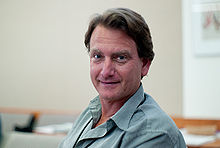- Marc Rotenberg
-
Marc Rotenberg 
Born April 20, 1960
Boston, MassachusettsNationality USA Alma mater Harvard College;
Stanford Law SchoolOccupation President, Electronic Privacy Information Center; Adjunct Professor of Law, Georgetown University Law Center Known for Privacy advocacy, Internet law, chess Marc Rotenberg is President and Executive Director of the Electronic Privacy Information Center (EPIC) in Washington, DC. He teaches Information Privacy Law at Georgetown University Law Center, and testifies frequently before Congress on emerging privacy and civil liberties issues, such as access to information, encryption policy, consumer protection, computer security, and communications privacy. He is a frequent guest on Bloomberg TV, CNN, C-SPAN, MSNBC, FoxNews, and National Public Radio, and contributes to The Economist, The New York Times, and USA Today.
He testified before the 9-11 Commission on "Security and Liberty: Protecting Privacy, Preventing Terrorism." He has authored many "friend of the court" briefs on law and technology, and has litigated important open government and privacy cases, including EPIC v. DHS, D.C. Cir. No. 10-1157, the effort to suspend the airport body scanner program. He is a member of the United States D.C. Circuit, First Circuit, Second Circuit, Third Circuit, Fourth Circuit, Fifth Circuit, Sixth Circuit and Ninth Circuit Courts of Appeal.
Rotenberg has served on several national and international advisory panels, including the expert panels on Cryptography Policy and Computer Security for the OECD, the Legal Experts on Cyberspace Law for UNESCO, and the Countering Spam program of the ITU. He chairs the ABA Committee on Privacy and Information Protection. He is a former Chair of the Public Interest Registry, which manages the .ORG domain. In 2010, he was named the North America representative to the At-Large Advisory Committee of ICANN.
Marc has helped establish several organizations that promote public understanding of computer technology and encourage civil society participation in decisions concerning the future of the Internet. These include the Public Interest Computer Association, the Public Voice Coalition, and the Civil Society Information Society Advisory Council to the OECD.
Marc Rotenberg is editor of Privacy and Human Rights: An International Survey of Privacy Laws and Developments (EPIC 2006), Privacy Law Sourcebook: United States Law, International Law, and Recent Developments (EPIC 2004), Under the Federal Open Government Laws (EPIC 2010), and co-editor of Privacy Law (Aspen Publishing 2007).
Marc Rotenberg is a graduate of Harvard College and Stanford Law School. He served as Counsel to Senator Patrick J. Leahy on the Senate Judiciary Committee after graduation from law school. He is a Fellow of the American Bar Foundation, and the recipient of several awards including the World Technology Award in Law and the Norbert Weiner Award for Social and Professional Responsibility. A tournament chess player, Rotenberg is a three-time Washington, DC Chess Champion (2007, 2008, 2010). He is also a scholastic crew referee and maintains the websites for the Washington Metropolitan Interscholastic Rowing Association (WMIRA) and the Virginia Scholastic Rowing Association (VASRA).
Marc Rotenberg grew up in Boston, Massachusetts. His brother Jonathan founded the Boston Computer Society at age 13, which became at one time the largest and most influential computing association in the world.
External links
Categories:- Privacy activists
- American lawyers
- Living people
Wikimedia Foundation. 2010.
